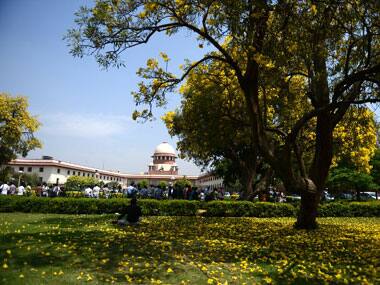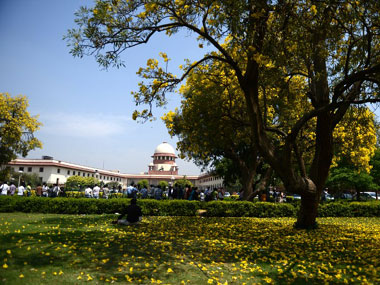The five-judge Supreme Court’s verdict striking down the National Judicial Appointments Commission (NJAC) puts the judiciary in conflict with not only the executive but the will of the people. That the apex court can strike down a law passed with overwhelming majorities in both houses of parliament and by 20 state assemblies shows that it is more keen to protect its own narrow interests than see its powers in the wider context of achieving the right balance of power between legislature and judiciary. [caption id=“attachment_2471024” align=“alignleft” width=“380”]  Reuters image.[/caption] While the details of the reasoning behind the bench’s verdict are awaited, the point that needs underscoring is that the judges are themselves an interested party in this verdict. So the judgment can hardly be called impartial or credible. A larger constitutional bench needs to rehear the matter. To be sure, the NJAC bill was not exactly perfect. The court was right to consider the issue of judicial independence, and whether the new law would affect this. But the logical thing to do was to read down the NDA law so that the power of the executive to influence appointments to the higher judiciary was limited. In particular, the insertion of the law minister into the commission could have been proscribed, and a more politically neutral member position created. Worse, the judgment appears to have restored the old, opaque collegium system with no checks and balances. That system was the result of the court effectively reinterpreting Ambedkar’s constitution to mean that the executive will have absolutely no say in the appointments of judges. Judges will thus appoint themselves, violating the fundamental democratic principle of balance of power and checks and balances. The bottomline: we have not heard the last of this issue. The battle will be rejoined shortly. Here’s what I had said earlier on matter. The government’s aggressive stand during hearings in the Supreme Court on the constitutional validity of the National Judicial Appointments Commission (NJAC) will effectively ensure that even if the bench strikes down the law, the old collegium system will not be revived. The NJAC law, passed in 2014 by both Houses of Parliament almost with no dissent, and by 20 states assemblies subsequently, clearly represents the overwhelming will of the people of India. This does not mean the court can’t strike it down on grounds of unconstitutionality, but it will certainly make the collegium system of appointing judges impossible to defend or revive. The collegium system came into being in the 1990s when the Supreme Court decided in two cases that judges will appoint themselves — unheard of in most parts of the world — and giving the executive almost no say in the business. This was not the mandate of the original Article 124 of the Constitution on the appointment of judges, which said that the President will appoint judges after consultations with the Chief Justice and any other judge he may want to. That the judiciary does not like the NJAC has been apparent from the start. First, the petitioners forced Justice AR Dave to recuse himself from the bench as he would have been part of the NJAC by law. This was followed by the CJI, HL Dattu, also refusing to join the committee to pick eminent persons to join the NJAC. The five-judge bench hearing the NJAC case also got the government to agree that the tenures of the additional judges whose probation would have ended during the pendency of the hearings would be extended without constituting the NJAC. However, Attorney General Mukul Rohatgi has been more than blunt in his arguments before the bench in order to send the clear message that there was no way the collegium could be restored. At best, there can be a stalemate over the appointment of judges, which neither government nor the judiciary may want. First, Rohatgi argued that the collegium system, which was brought in by a nine-judge bench, cannot be restored or the NJAC law overturned by a smaller, five-judge bench. He also got five BJP state governments to send in their lawyers to back his contention. At the hearing yesterday (11 May), Rohatgi not only again sought an 11-judge bench to hear the case, but also said that the collegium system was dead. This court could not revive it, for Parliament will not be pushed around by what it would say when it had decided otherwise. According to a report in The Indian Express, the bench asked Rohatgi what would happen if it quashed the amended Article 124 that enabled the constitution of the NJAC. His unambiguous reply: Article 124 is over. If the court strikes it down, Parliament would not revive the old article, which a nine-judge Supreme Court bench had interpreted to give itself an unintended mandate to choose judges. The Express reports that the Rajasthan government’s lawyer, K Parasaran, made it clear that Article 124, in the form it had been interpreted by the top court to establish a collegium, would never be revived. To drive home the message deeply, Rohatgi emphasised the court’s own interest in the case. He pointed out, unsubtly, that the court was effectively judging its “own cause”. The five-judge bench may yet recuse itself and ask for a 11-judge bench to finally hear the case. But it was left in no doubt that the collegium system was never going to come back. NJAC may be stillborn, but the collegium is over for good.
The five-judge Supreme Court’s verdict striking down the National Judicial Appointments Commission (NJAC) puts the judiciary in conflict with not only the executive but the will of the people.
Advertisement
End of Article
Written by R Jagannathan
R Jagannathan is the Editor-in-Chief of Firstpost. see more


)

)
)
)
)
)
)
)
)



